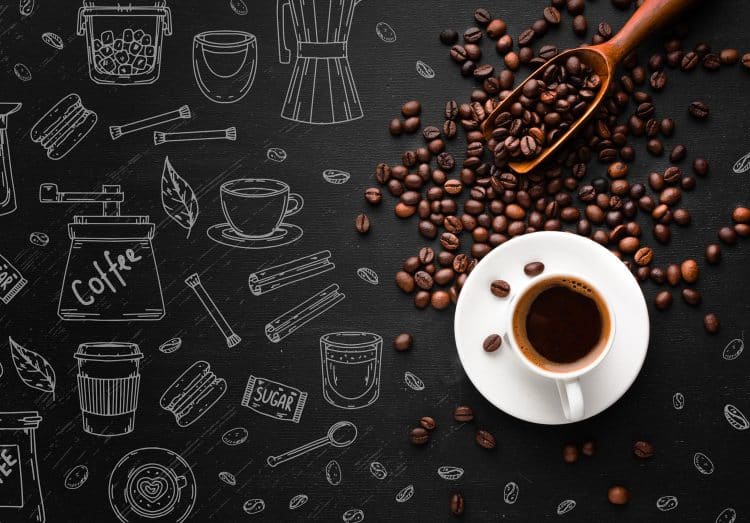Intermittent fasting emerges as a preferred diet for those planning to lose weight. It is known to have several metabolic health benefits, including an improvement in insulin response or a decrease in cholesterol levels.
While you could choose from multiple intermittent fasting protocols, the primary premise of this fasting method is to split the day into eating and fasting periods. This could involve time-restricted fasting, the twice-a-week method, alternate-day fasting, or keeping 24 hours fast.
Regardless of the pattern you choose for intermittent fasting, this method does not restrict your dietary choices during the eating window. Consumption of calorie-free liquids and water is advised during the fasting period. However, if you are someone who doesn’t want to part with your cup of coffee, here’s more on whether the consumption of coffee during intermittent fasting is okay.
Will Coffee Disrupt Your Fasting Regimen?
Before jumping to conclusions about coffee, it’s best to understand its nature and why it is associated with several health or fasting studies. Coffee contains caffeine, which is a potent stimulant.

A standard cup of coffee contains about 94.8 mg of caffeine. So, you can expect at least 40 mg of caffeine in every 100 grams of coffee.
Caffeine is an energy booster. Then why should it not be consumed during fasting?
Well, there are no straight answers to that, but many believe caffeine can affect your fast. Moreover, a cup of black coffee contains only a few calories. Hence, the calorie impact on your fast is likely minimal.
Are you wondering how many calories it takes to break a fast?
Anything that contains a calorie can break your fast technically, and this goes for almost everything that includes calories, including carbohydrates, fats, proteins, and alcohol. So, if your coffee spikes insulin in your body, you will end up breaking your fast.
The question is whether your coffee contains calories.
You must be cautious with coffee additives during intermittent fasting. High-calorie additives will not only break your fast but also increase blood sugar levels. This will hamper the benefits of fasting, especially if you aim to reduce body weight. [1]
[sc name=”style-summary2″ ]
Trivia: Caffeine was banned in some sports and competitions between 1984 and 2004. [2]
[/sc]
Is Coffee Beneficial?

Caffeine has several benefits. The long-term benefits include improved alertness and reduced risks of Parkinson’s and Alzheimer’s disease. [3] Intrinsically, coffee is calorie-free and may not add calories if consumed in its standard form.
Drinking coffee flavored with caramel, hazelnut, vanilla, or butter may not have extra carbs, especially if you use coffee mixes with artificial flavorings. However, it increases the risk of increasing your hunger and triggering type 2 diabetes, especially if the coffee contains sugar. On the other hand, consuming sugar-free coffee can reduce the risk of type 2 diabetes. [4]
Additives such as cream, sugar, milk, or any other agents like artificial sweeteners can boost the calorific value of your coffee. However, if you plan to include coffee in your eating window, consider fat-free creamers or fat-free milk, or even milk alternatives with relatively fewer calories.
A regular sugar sachet could contain up to 15 calories, so you can imagine how adding one or multiple packets can spike your coffee’s calorie content. Even artificial sweeteners such as stevia or Splenda can increase your appetite, leaving you hungry. [5]
What Kind of Coffee Can You Drink When Intermittent Fasting?
While fasting, you can try sticking to black coffee without sugar or artificial sweeteners; espresso or drip coffee can be a good choice. You can add milk alternatives, such as almond or soy, or flavor it with a pinch of spice, like nutmeg or cinnamon. But you’ll have to check if it will significantly contribute to your coffee’s caloric value.
You can consume several beverages instead of coffee during the fasting window. One of the safest natural drinks is mineral water, which will not break your fast even when consumed during your fasting routine’s eating window. It is also essential for restoring electrolyte balance.
Other low-calorie drinks you can consume during intermittent fasting include unsweetened black tea, green tea, coconut water, and lemon water.
Does Coffee Lead to Dehydration While Fasting?
Caffeine in coffee has a diuretic effect but is unlikely to dehydrate you. [6] Only consuming more than five cups a day could trigger a diuretic impact. Drink more water to neutralize the effect of caffeine. [7]
Some studies indicate that coffee could increase your bathroom trips, but that shouldn’t be the case when consumed within limits. [8] So, you can safely drink unflavored and unsweetened coffee during intermittent fasting, as it is least likely to dehydrate you.
Weighing Pros and Cons of Having Coffee During Intermittent Fasting
Let’s go over the risks and benefits of coffee during IF:
Risks
Let’s first look at the drawbacks of drinking coffee during intermittent fasting.
As a stimulant, the caffeine in coffee can wreak havoc on your system if you go overboard. Moreover, drinking coffee on an empty stomach can cause gastrointestinal problems such as diarrhea or nausea. Intermittent fasting comprises fasting and eating windows. Consuming coffee during long fasting hours can irritate your stomach lining.
You may not notice any significant effects if you consume coffee while fasting. But the additives in your coffee that you may add to make your coffee more palatable may make you feel hungrier during a fast and affect your blood sugar levels. This can cause more hunger and bloating and negate the effects of your fasting goals. [9]
A cup of coffee may contain about 100 mg of caffeine, so you should restrict it to 4–5 cups a day. [10] Too much caffeine consumption can increase heart palpitations and temporarily increase blood pressure. [11]
If you have gastrointestinal issues like high acidity, skipping coffee during fasts could be a good idea. Research indicates that coffee stimulates gastric acid secretion and leaves a bitter taste in the mouth. [12]
Consumption of coffee can activate salivary alpha-amylase secretion and stimulate gastric secretion by producing gastrin and hydrochloric acid.
Pros
Here’s how coffee can bolster the benefits of intermittent fasting:
Improves Mental Alertness
Fasting can lower your energy levels. A cup of coffee can improve your mood and enhance mental alertness. [13]
Improves Athletic Performance
Coupling your fasting routine with workout schedules and unsweetened, zero-calorie coffee can improve athletic performance, contributing to better weight loss and muscle gain results. [14]
It may effectively lower the risks of Alzheimer’s, Parkinson’s disease, type 2 diabetes, and gout. [15]

Can Enhance Autophagy
Autophagy is the process by which the body breaks down, and repairs damaged cells. Studies reveal that coffee can trigger health benefits by stimulating autophagy with the polyphenols contained in coffee. [16]
May Moderate Gut Microbiota
Intermittent fasting can benefit your gut health and boost your microbiome. If you are looking for ways to increase your gut microbiome diversity, coffee could help. Studies show that coffee consumption may positively impact gut microbiota. [17]
May Reduce Inflammation
Intermittent fasting is considered better than many other diets, especially when it concerns improving conditions associated with inflammation, such as asthma, arthritis, etc.
The phenolic compounds in coffee can impact glucose metabolism through various mechanisms. Hence, drinking coffee in moderate amounts, minus the calorie-causing additives, can benefit insulin sensitivity and reduce inflammation. [18]
Some people report coffee as an appetite suppressant, making sustaining the fast easier. However, this remains scientifically unproven.
FAQs
1. Could adding ingredients to your coffee reduce fasting benefits?
Yes, it could, although coffee alone isn’t likely to break your fast or interfere with its goals. Loading your cup of coffee with high-calorie additives such as sugar and milk can limit fasting benefits.
2. Can I drink black coffee when fasting?
Unsweetened black coffee is a good beverage choice during intermittent fasting.
3. Will coffee leave me dehydrated during the fasting period?
Moderate coffee intake without additives may not cause any significant dehydration. However, consuming more than five cups of coffee daily could trigger a diuretic impact, especially if you are not replenishing your body with other hydrating fluids like water.
4. Can I drink flavored coffee while intermittent fasting?
If your flavored coffee contains calories, you shouldn’t consume it during your fasting window, as it will break your fast and increase hunger.
5. Does drinking coffee during intermittent fasting impact sleep?
Coffee, consumed in moderate amounts, will not likely harm your sleep quality. However, steer clear of excessive coffee intake or drinking it too close to your bedtime, as it can disrupt your sleep.
Wrapping Up
Drinking coffee during intermittent fasting can be a personal preference, provided you do not add any calories during the fasting window.
Refrain from caffeine overconsumption. It could make you lose sleep and trigger hunger pangs. A moderate amount of unsweetened black coffee during intermittent fasting may not cause any harm. However, you must avoid additives such as creamers, milk, and sugar.
This way, you can include coffee not just in the eating window but also in the fasting window.
References
- Collier, Roger. “Intermittent Fasting: The Science of Going Without.” PubMed Central (PMC), n.d.
- Diel, Patrick. “Caffeine and Doping—What Have We Learned since 2004.” PubMed Central (PMC), July 22, 2020.
- Wierzejska, R. (2016, November 15). Can coffee consumption lower the risk of Alzheimer’s disease and Parkinson’s disease? A literature review. PubMed Central (PMC).
- Bidel, S., & Tuomilehto, J. (2013, August 23). The Emerging Health Benefits of Coffee with an Emphasis on Type 2 Diabetes and Cardiovascular Disease. PubMed Central (PMC).
- Yang, Q. (2010, June 1). Gain weight by “going diet?” Artificial sweeteners and the neurobiology of sugar cravings: Neuroscience 2010. PubMed Central (PMC).
- Killer, S. C., Blannin, A. K., & Jeukendrup, A. E. (2014, January 9). No Evidence of Dehydration with Moderate Daily Coffee Intake: A Counterbalanced Cross-Over Study in a Free-Living Population. PubMed Central (PMC).
- C. (2022, June 6). Water and Healthier Drinks. Centers for Disease Control and Prevention.
- Caffeine and diuresis during rest and exercise: A meta-analysis – PubMed. (2015, September 1). PubMed.
- Nehlig, A. (2022, January 17). Effects of Coffee on the Gastro-Intestinal Tract: A Narrative Review and Literature Update. PubMed Central (PMC).
- [Caffeine–common ingredient in a diet and its influence on human health] – PubMed. (2012, January 1). PubMed.
- Kujawska, A., Kujawski, S., Hajec, W., Skierkowska, N., Kwiatkowska, M., Husejko, J., Newton, J. L., Simoes, J. A., Zalewski, P., & Kędziora-Kornatowska, K. (2021, September 25). Coffee Consumption and Blood Pressure: Results of the Second Wave of the Cognition of Older People, Education, Recreational Activities, Nutrition, Comorbidities, and Functional Capacity Studies (COPERNICUS). PubMed Central (PMC). https://doi.org/10.3390/nu13103372
- Medicine (US) Committee on Military Nutrition Research, I. O., & Marriott, B. M. (1994, January 1). Effects of Caffeine on Cognitive Performance, Mood, and Alertness in Sleep-Deprived Humans – Food Components to Enhance Performance – NCBI Bookshelf. Effects of Caffeine on Cognitive Performance, Mood, and Alertness in Sleep-Deprived Humans – Food Components to Enhance Performance – NCBI Bookshelf.
- Martins, G. L., Limongi França Guilherme, J. P., Boiko Ferreira, L. H., de Souza-Junior, T. P., & Herbert Lancha, J. A. (2020, December 11). Caffeine and Exercise Performance: Possible Directions for Definitive Findings. PubMed Central (PMC).
- Zhang, Y., Yang, T., Zeng, C., Wei, J., Li, H., Xiong, Y. L., Yang, Y., Ding, X., & Lei, G. (2016, July 15). Is coffee consumption associated with a lower risk of hyperuricaemia or gout? A systematic review and meta-analysis. PubMed Central (PMC).
- Pietrocola, F., Malik, S. A., Mariño, G., Vacchelli, E., Senovilla, L., Chaba, K., Niso-Santano, M., Maiuri, M. C., Madeo, F., & Kroemer, G. (2014, April 25). Coffee induces autophagy in vivo. PubMed Central (PMC).
- González, S., Salazar, N., Ruiz-Saavedra, S., Gómez-Martín, M., de los Reyes-Gavilán, C. G., & Gueimonde, M. (2020, May 1). Long-Term Coffee Consumption is Associated with Fecal Microbial Composition in Humans. PubMed Central (PMC).
- Rebello, S. A., Chen, C. H., Naidoo, N., Xu, W., Lee, J., Chia, K. S., Tai, E. S., & van Dam, R. M. (2011, June 2). Coffee and tea consumption in relation to inflammation and basal glucose metabolism in a multi-ethnic Asian population: a cross-sectional study. PubMed Central (PMC).
- Liszt, K. I., Ley, J. P., Lieder, B., Behrens, M., Stöger, V., Reiner, A., Hochkogler, C. M., Köck, E., Marchiori, A., Hans, J., Widder, S., Krammer, G., Sanger, G. J., Somoza, M. M., Meyerhof, W., & Somoza, V. (2017, July 10). Caffeine induces gastric acid secretion via bitter taste signaling in gastric parietal cells. PubMed Central (PMC).


